ADHD diagnoses helping adult sufferers
- Published
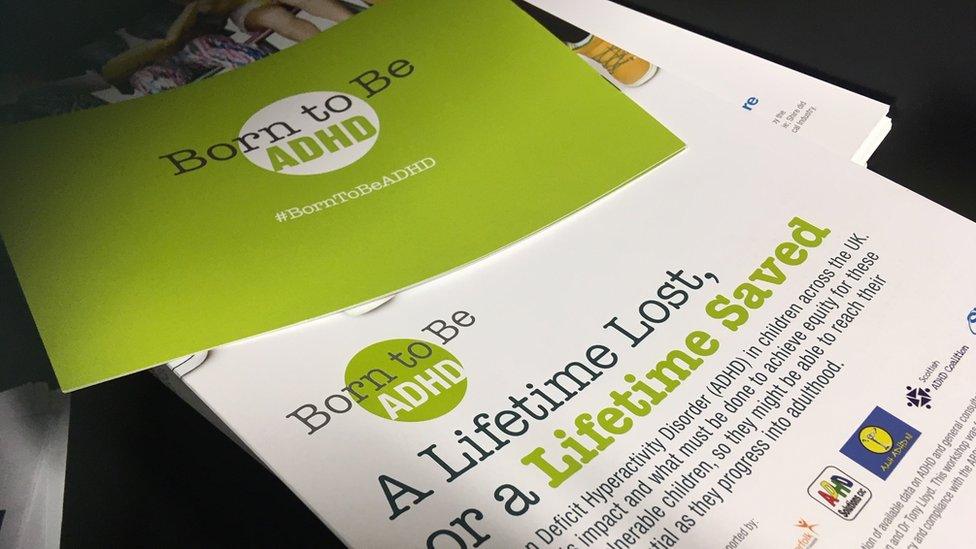
Adult Attention Deficit Hyperactivity Disorder was officially recognised by the NHS in 2009
Ten years after adult attention deficit hyperactivity disorder (ADHD) was officially recognised by the NHS, adults can still struggle to be diagnosed and get treatment.
The condition is characterised by inattentiveness, hyperactivity and/or impulsivity.
It affects the executive function of the brain - people's ability to plan, organise and complete tasks.
That is familiar to Enniskillen man, Niall Greene.
He was 25 years old before he discovered he had ADHD.
As a child, his restlessness had been so unbearable he'd imagined sawing off his own legs.
He left school with no qualifications and when he left home at 18 his life spiralled out of control.
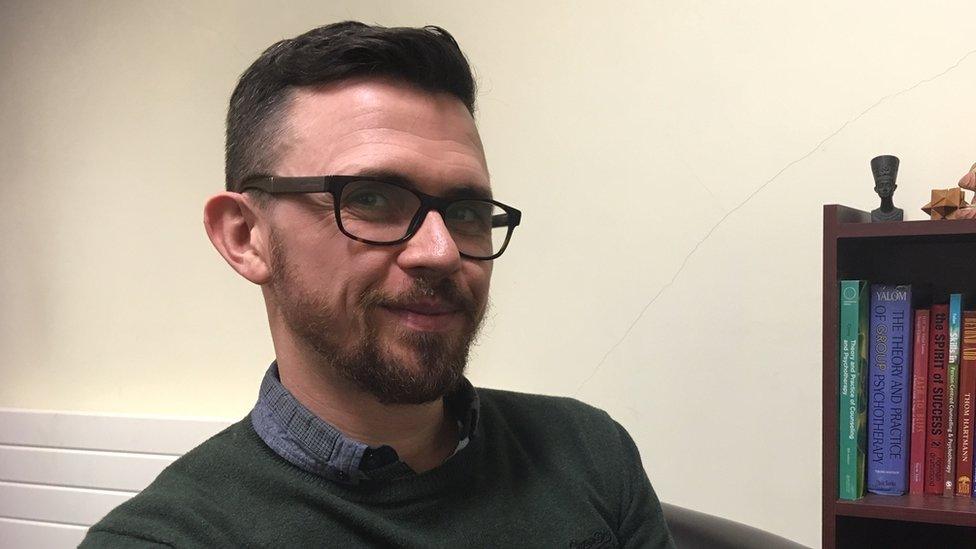
Enniskillen man Niall Greene was 25 when he discovered he had the condition
"I could never maintain employment," he says.
"I struggled to keep a roof over my head, couldn't manage finances, impulsively spent any money that I had."
'I thought I was useless'
Niall says he struggled with addictions.
"I was smoking very young and drinking very young and basically everywhere I went, there was chaos," he says.
"Friendships and relationships were breaking down, depression and anxiety started to get worse and worse.
"I thought I was useless, I thought I was stupid, I thought it was a problem with motivation that was wrong with me.
"So I started using drink and drugs every chance that I could and when I wasn't out of my head, I was starting to feel suicidal and there were suicide attempts."
It's a pattern all too familiar to consultant psychiatrist Ryan O'Neill.
"With adult ADHD in general, there's an increased co-morbidity of other mental health problems, including anxiety disorders, substance abuse, mood disorders and personality disorder also," he says.
"With untreated ADHD, you're much more at risk of having difficulties with substance misuse, you're more likely to be arrested, you're more likely to be divorced, you're more likely to have multiple jobs over short periods of time.
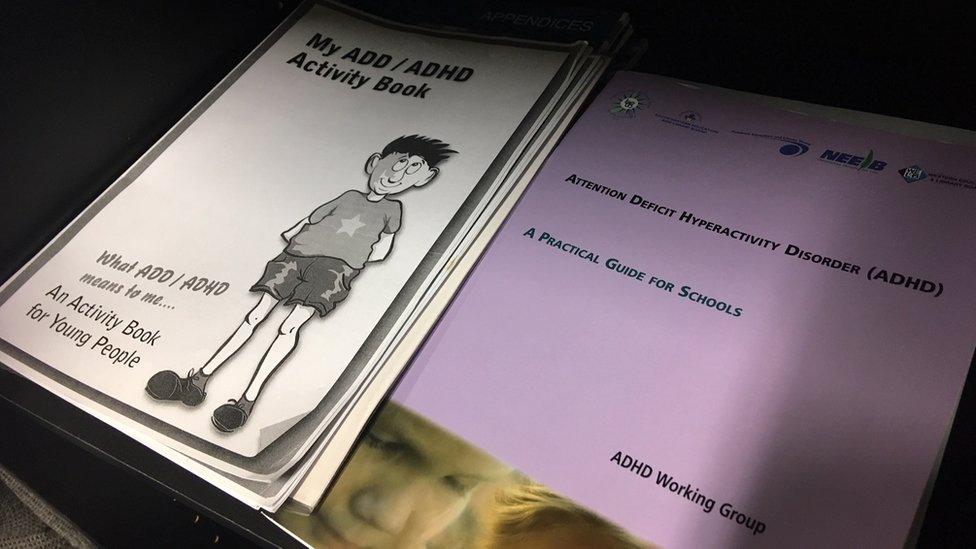
Children diagnosed with ADHD can have their medication stopped when they become adults
"Those types of patterns are more likely without treatment than with treatment."
Problems can also arise when someone has been diagnosed with ADHD as a child and is on medication.
Because they're treated through child and adolescent mental health services (CAMHS), when someone is no longer a child their medication can be taken off them.
'How am I going to cope?'
Sarah Rooney was diagnosed in her early teens and given medication to help cope with her symptoms. She had already struggled at school.
"I had teachers asking me how they could help me, and honestly, back then, I just thought: 'I don't know how you're supposed to help me because I don't really know anything about this either,'" she says.
"I wasn't getting counselling - I had to go to my doctor and say I was having real trouble sleeping, then they'd just be like, they didn't even know what to do.
"There was no main package, there were just little things like the medication might help.
"And then all of a sudden, that's taken away from you because of your age and then you're just sort of left with like: 'Oh, how am I going to cope with this?'"
Support groups like Adult ADHD NI helped Sarah.
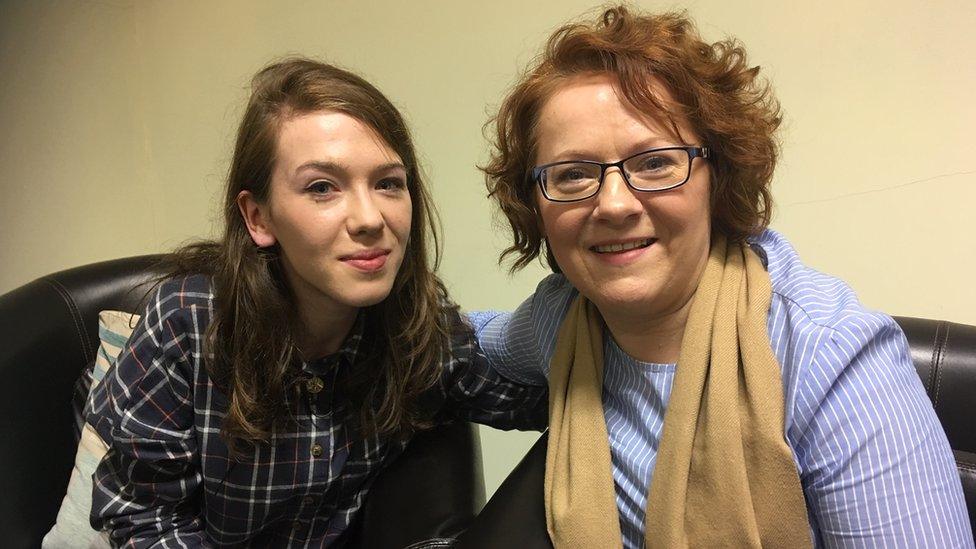
Sarah Rooney - pictured with her mother Kate - received help from support groups
"If you think of the age of 16, you're potentially going through exams or even trying to get yourself onto a career pathway, you're losing your medication that I would imagine has had such a positive and significant impact on your ADHD symptoms," says Emma Weaver, who co-founded the group with Niall Greene.
"You lose them and your life is just going to spiral into chaos.
"How are you supposed to manage just because you turn 16?
"You still have the same symptoms, and yet you're getting no medication to reduce or alleviate the impact of that."
'Fall through the net'
It is a gap in the system that Ryan says professionals are aware needs to be addressed.
"There is a recognition that there needs to be much more integration through that transition from child and adolescent mental health services or paediatric services across to adult services," he says.
"Those services are very different and if that's not done in a very controlled and processed way, young people can fall through the net.
"That would lead to increased impairments in a part of life that's very important when they're moving towards educational goals and occupational goals at around 16.
"In the future, you could see that we would have transitional services for young people from the ages of 16 to 25, so it kind of bridges that difficult time."
Services vary across the Northern Ireland's health trusts.
The Western Trust has trained teams to diagnose and treat it.
The South Eastern Trust says it is developing a process for adult ADHD, including medication after patients leave the paediatric service.
The Belfast Trust hopes to have specific services in place later this year.
The Northern Trust does not have a specialist service and the Southern Trust has no standalone service.
But for some, ADHD can be positive.
Gareth Wilson was diagnosed in his early 30s, after a former partner suggested he might have the condition.
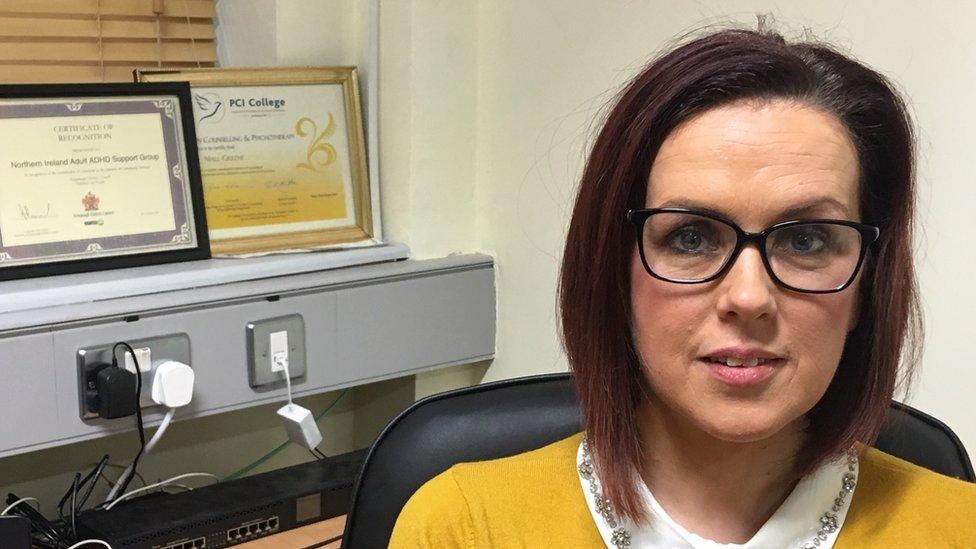
Emma Weaver co-founded Adult ADHD NI with Niall Greene
He tended more towards obsessional thinking and hyper-focus, which helped him through his education and into a good job.
But there were signs of the condition after he left home for university.
"When I hit uni and you're in charge of your own time and your own money that's when my executive function, it just became blatantly obvious it wasn't there," he says.
"So I did get myself into a lot of financial trouble.
"Also trying to be on time for classes, for meetings - I was an hour late for starting my first job.
"And it affects friendships, particularly long-distance friendships.
"We're very much 'in sight, in mind', so if someone you love isn't just there it's hard to remember to give them a call."
'Definitely changed my life'
Gareth is more in control of his ADHD now, thanks to medication.
Sarah has used cognitive behavioural therapy to tackle hers and is currently medication-free.
After diagnosis and ongoing medication, Niall returned to school and recently graduated with a degree in counselling and psychotherapy.
He believes the impact of finding out you have the condition can't be overestimated.
"An ADHD diagnosis has the potential to completely change someone's life - it definitely changed my life," he says.